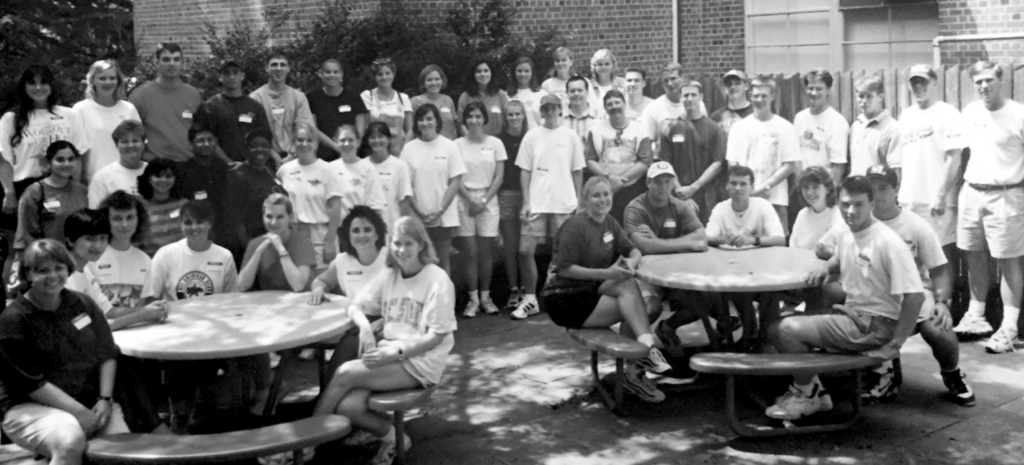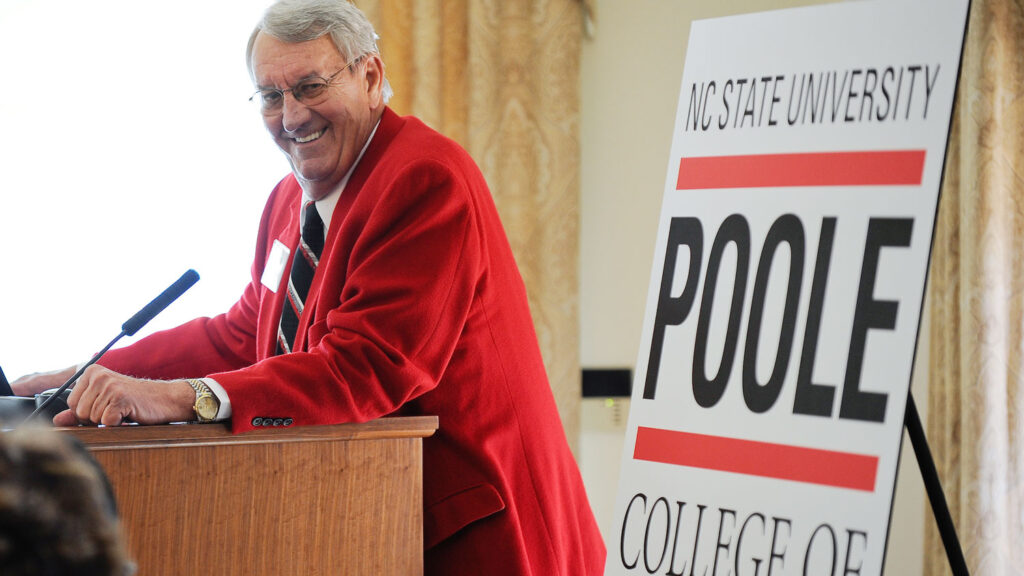Look Back on 30 Years of Poole College
As we celebrate our anniversary, we’re reflecting on the important milestones and achievements that underpin the rising reputation of the Poole College of Management.

Since its founding in 1992, the Poole College of Management has leveraged the strengths of NC State — its STEM expertise, research excellence and close ties to North Carolina communities and businesses — to serve the evolving needs of both students and industry. The college has been at the forefront of what a modern business school should be — innovative, practical and connected — from our early days in offices scattered across campus, to today with our home in Nelson Hall and programs that reach students around the world. Take a look back on some key milestones with us.
The beginnings of Poole College of Management in the first decade.




-
1992
Established the new College of Management.
In the 1980s, the Department of Economics and Business was graduating more students than any other department on campus. The rising demand for courses in business, economics and accounting highlighted the need for a new college. In 1992, the College of Management was established, led by Bob Clark, with less than half the necessary faculty and staff, no endowments and offices located in four buildings. In many ways, the college started out as the sort of entrepreneurial enterprise that many of its students and alumni would go on to found. -
1993
Richard Lewis appointed as the first dean of the college.
In 1993, Richard Lewis became the first full-time dean of the newly created College of Management. -
1994
Established Master of Accounting degree.
Launched the Technology Entrepreneurship Commercialization program.
In 1994, just two years after the College of Management was established, its faculty created the Master of Accounting (MAC) program – the college’s first new professional graduate program and now one of five Jenkins Graduate Programs based in the Poole College of Management. In the spring and fall of 2019, the Jenkins MAC program celebrated twenty five years of accounting graduate education at Poole College.
The same year, to meet the needs of the Research Triangle’s growing tech sector, the college launched the Technology Entrepreneurship Commercialization (TEC) program. The program, which now includes the TEC Concentration of the Jenkins MBA as well as a TEC Certificate, teaches students how to launch a technology startup or bring new technologies to market. The TEC program has helped students create more than 25 new startups that employ over 400 people and have raised more than $700 million in financing. -
1999
Jon Bartley appointed as the college’s second dean.
Created the Supply Chain Resource Cooperative.
In 1999, Jon Bartley became the college’s second dean. During his tenure, the college hired 20 new faculty members across three departments, and quadrupled the size of its endowments and the amount of its annual giving.
Also that year, the college established the Supply Chain Resource Cooperative (SCRC) to bridge the gap between classroom instruction and real-world application. It established a model for future Poole Initiatives. Since 2000, over 2,200 Poole students have completed over 630 supply chain research projects through the SCRC. -
2000
Received AACSB accreditation. Completed renovations of Nelson Hall.
The Poole College of Management was accredited by the Association to Advance Collegiate Schools of Business (AACSB), one of the most rigorous educational accrediting agencies, in 2000. This critical accreditation affirms that a school is providing its students with a challenging, relevant education that prepares them for the business world. Less than 6% of business schools worldwide have AACSB accreditation.
When the School of Textiles moved out of Nelson Hall in 1991, extensive renovations began, adding an elevator and making room for the College of Management and the Department of Agricultural and Resource Economics. The second phase of renovations finished in 2000, affecting 98,768 square feet at a total project cost of $7,332,000. The completed renovations united the college’s faculty under one roof for the first time.
A flourishing second decade at the Poole College of Management



-
2002
Launched MBA program.
What started as a Master of Science in Management was redesigned as a Master of Business Administration (MBA) in 2002. This change was critical to meeting the needs of employers and reducing confusion for job-seeking graduates. Steve Allen transformed the MSM curriculum into a world-class MBA curriculum and paved the way for a successful rollout of the new MBA program. -
2004
Ira Weiss appointed as the third dean of the college. Launched the Enterprise Risk Management Initiative.
Ira Weiss became the college’s third dean in 2004. During his tenure, he championed global business awareness for Poole College students through new international programs, and facilitated several significant naming gifts and endowments.
Also in 2004, Enterprise Risk Management (ERM), the second Poole Initiative, was established to help businesses — and future business leaders — identify and address risks holistically. To address this rapidly growing need for enterprise risk management solutions, the ERM Initiative provides research and thought leadership, executive training and roundtables, and graduate programs. -
2006
Created a satellite location for the MBA program.
In order to better accommodate the needs of working professionals in the Research Triangle region and beyond, the college introduced a satellite location for the MBA program in Research Triangle Park (RTP). Part-time evening classes were offered at the satellite location through the Professional Evening MBA program, making it easier for students who work full time to complete their MBA. -
2007
Graduate programs are named in honor of Ben Jenkins.
A naming gift by Benjamin “Ben” Jenkins III — the former vice chairman and president of the General Bank at Wachovia Corp., and an NC State alumnus — created the Jenkins Graduate Programs in 2007. The gift accelerated the college’s growth and commemorated Jenkins’ long-standing support for the university and its economic development initiatives.
“It’s not just the technical skills that you need to be successful; it’s the people skills,” Jenkins said in 2007. “Management programs round out a person’s prior education, providing the skill sets needed for success in business today. This is what I think the college and this graduate school can offer to technology-based graduate students. That’s why I’m so excited about this honor.” -
2009
Established the Department of Management, Innovation and Entrepreneurship. Launched Executive Education.
In 2009, the college created the Department of Management, Innovation and Entrepreneurship (MIE). Faculty in MIE conduct research and teach in fields related to technology implementation, organizational culture in technology firms, entrepreneurship and technology commercialization, new product development processes, and more.
Same year, Dean Ira Weiss recognized the need for an executive education model that served the needs of our partners and leveraged the extensive, unique resources at NC State. The result was a business model designed to support leadership development during one of the most dynamic periods of organizational innovation and change. Now, NC State Executive Education designs and delivers interdisciplinary custom programs for organizations and open programs for individual professionals. One of the most successful programs, Women in Technical Leadership, has engaged 152 participants from 2 countries and over 20 different companies since 2019. -
2010
Received the university’s largest-ever endowment and named the college for Lonnie Poole.
A $37 million endowment from Lonnie and Carol Poole — part of what was then the largest gift ever made to NC State — inspired the college’s name change to the Lonnie C. Poole Jr. College of Management in December 2010. The transformational endowment has touched a multitude of areas across the college, but the Pooles personally chose two key disciplines — entrepreneurship and sustainability — as critical for the college’s future success. Both have grown substantially in the years since.
In an interview with the Triangle Business Journal, Chancellor Randy Woodson said the gift would “elevate our ability to have one of the most competitive business colleges in the country.” -
2011
Introduced the online MBA program.
In order to serve working professionals with a flexible graduate program that fits their lifestyles, the Poole College of Management rolled out an online MBA in 2011. It expanded upon the college’s lineup of flexible educational offerings for working professionals both in the local community and around the world. -
2012
Introduced the Master of Management, Global Luxury Program (GLAM).
The Global Luxury and Management (GLAM) program graduated its first class in 2013. It was a unique, accelerated dual degree program in which students receive a Master of Management with a concentration in Global Luxury from NC State, and a Master of Science in Global Luxury Management from SKEMA Business School in Paris, France. The program ended in 2021 not due to a lack of success, but rather because of a shift in the long-term goals of the college.
The third decade at the Poole College of Management saw the college become a leading thought leader, creating a wider reaching impact.






-
2014
Established the first endowed dean’s chair at NC State.
In 2014, Chancellor Randy Woodson announced a $4 million endowment established by Steve and Judy Zelnak to create the university’s first endowed dean’s chair — the Stephen P. Zelnak Jr. Dean’s Chair within the Poole College of Management. An endowed deanship is the most prestigious position in a college, and it provides a valuable resource for recruiting, retaining and rewarding the most distinguished of academic leaders in management education. Ira Weiss was the inaugural recipient of the Stephen P. Zelnak Jr. Dean’s Chair. -
2015
Launched two new initiatives: the Entrepreneurship Clinic and the Business Sustainability Collaborative.
In 2015, two new Poole Initiatives were born — the Entrepreneurship Clinic and the Business Sustainability Collaborative. These two focus areas, identified by Lonnie and Carol Poole as priorities for their naming gift to the college, are key interdisciplinary areas where NC State and the college shine. With the launch of these initiatives, the college began integrating entrepreneurship and sustainability into program offerings. -
2016
Annette L. Ranft appointed as the college’s fourth dean. Established the Business Analytics Honors Program.
Annette L. Ranft became the college’s fourth dean and first female dean in 2016. Ranft came to NC State from the University of Tennessee and was named to The Wall Street Journal’s list of top female business school administrators in 2012.
In response to the growing demand for data analytics talent, the Business Analytics Honors Program was launched. The interdisciplinary program is open to undergraduate students from any major or concentration in the college. The honors program includes a practicum course that gives students hands-on experience working with a local industry partner to develop an analytics-based solution to a real-world problem. -
2019
Frank Buckless appointed as the college’s fifth dean.
Created the online Master of Accounting program.
Frank Buckless became the college’s fifth dean in July 2019 after serving as associate dean for faculty and academic affairs and head of the Department of Accounting, which he joined in 1989. Under his leadership, the college innovated through the Covid pandemic, successfully launching two Master of Management degree programs.
Following 25 years of being consistently ranked among the top MAC programs nationwide, the college launched the Jenkins Online MAC to meet the needs of a changing market and provide flexibility to individuals pursuing a MAC degree. -
2020
Launched the Business Analytics and AI Initiative.
As evolving technology increased the demand for data analytics to help drive business decisions, Poole College established the Business Analytics and AI Initiative (BAI). This initiative brings together the college’s business analytics curricular programs, research activities and industry partnerships, and creating space for new ones, like the Business Analytics Certificate program. -
2021
Introduced the Master of Management, Marketing Analytics.
Poole College continued growing its offerings in the field of business analytics by launching the Master of Management, Marketing Analytics program in the fall of 2021. This is the second graduate degree in marketing analytics offered in the Southeast, and the second graduate degree program focused on marketing in North Carolina. The program was designed to develop talent in an area where industry sees a critical need. -
2022
Launched the Master of Management, Risk and Analytics.
The college launched the Master of Management, Risk and Analytics concentration in 2022. Designed to develop leaders ready to hit the ground running, the program lays a foundation in data analytics and enterprise risk management and rounds it all out with relevant, real-world, hands-on experience. Students learn from top risk management experts in the college’s renowned Enterprise Risk Management Initiative.
Today, the Poole College of Management enters its fourth decade as a vibrant community of over 4,400 students, 35,000 alumni and nearly 200 full-time faculty and staff — strategically positioned to grow in ways that fulfill our mission to generate new ideas and develop innovative leaders to positively impact our world.
- Categories:





